The Buckaroo Effect: Understanding How Stress Works
“Stress isn’t a sign of weakness — it’s your mind and body letting you know that the load you’re carrying has become too heavy.”
— Dr Luke Sullivan, Clinical Psychologist and Founder of Men’s Minds Matter
What Stress Really Is
At Men’s Minds Matter, we consider emotions and feeling as an asset and a strength to he tapped into. Feelings and emotions help guide us and bring us information which we can benefit from.
Stress is one such emotion which arises when the demands placed upon us exceed the resources, we have available to meet those demands.
Stress gives that feeling of being stretched, compressed, or pulled in many directions. It’s a signal that we are struggling to keep up and stay on top of things. It’s meant to be helpful, but everyone’s seen cases where stress spirals beyond what’s management or healthy.
How We Respond to Stress
When life turns up the pressure, most people instinctively shift their resources so that they can give more to the most pressing and demanding issue.
We divert time, energy, and attention from less urgent areas to focus on high-priority issues like work crises, relationship problems, financial concerns, or health challenges.
In the short term, this can be an effective strategy. It helps us overcome immediate challenges and restore balance once the stressor passes. It’s our first go to response.
When the Pressure Doesn’t Stop
When the stressors don’t go away and we find ourselves in situations where the demands constantly outstrip the resources.
If the demands stay high — if there’s no recovery, no reprieve — we can’t keep redistributing our limited energy without consequence. Eventually, we run out of capacity or take more time from other things which are important to us.
At this stage, the answer isn’t to dig deeper or try harder. What’s needed is more support — not more from the person, but more for the person. That could mean extra manpower, better systems, new technology, sharing the load or accepting that not all things can be done.
Introducing the Buckaroo Effect
If you’ve ever played the classic children’s game Buckaroo, you’ll remember the image: a spring-loaded mule steadily loaded with more and more items until, suddenly, it kicks, and everything flies off. You never know which piece will be the one that triggers the reaction — it could be something big, or something seemingly insignificant. It’s rarely just that final item that causes the problem; it’s the build-up of the whole load which is more than the mule can carry.
Human beings are much the same. We can often carry heavy loads, a lot of pressure, responsibility, and strain but we also have our limits. If you don’t pay attention to your limits eventually, one more task, one more demand, one more stressor becomes too much — and we react.
That reaction might look like being snappy or irritability, angry outburst, withdrawal, difficulties performing, doing and thinking or worse: burnout. It might seem sudden, but it’s the cumulative effect of carrying too much for too long.
At which point we need to lighten the load
What Can We Learn from the Buckaroo Effect?
Stress is a messenger, not a malfunction.
Recognising the Buckaroo Effect helps us to know our own limits and how to respond when stress is letting us know that we’ve reached or surpassed them. If we listen to it early, before the mule kicks, we can protect our wellbeing, our relationships, and our ability to keep going, consistently giving what we are willing to give. Setting our boundaries and protecting (dare I say it) – ‘our work life balance’.
Burnout is bad and of no benefit to anyone. In my experience, people can take a long time to recover, stopping them in their tracks in some cases from doing even basic things to look after themselves. The cost to the UK economy is estimated to be between £50-100 billion each year. Overloading people doesn’t make economic sense.
At Men’s Minds Matter, we work hard to counter the prevalence of toxic positivity in online spaces, where emotional struggles are often implicitly framed as personal failings or signs of weakness. People don’t “break down” because they’re weak; they react because they’ve been overloaded.
The solution isn’t to tell them to toughen up and carry more— it’s to change culture, challenge people but don’t overload them, increase resources when overstretch is permanent or accept that not all things will or can get done.
I can see the workaholics and executives writhing in their seats – with due regard, because the hard truth is, burnout is a normal response to abnormal demands. You might feel untouchable, but stress doesn’t care — it’s wired into how we function.
Top Tips for Managing the Buckaroo Effect
-
Notice the signs early
Stress often shows up before we consciously recognise it — tightness in your chest, irritability, tiredness that doesn’t go away, or finding it hard to switch off. These are early warning lights, not failures. Pay attention before the load builds up.
-
Check your load, not your strength
When things feel too much, the instinct is to question your resilience. Instead, look at the load you’re carrying. Are there too many tasks, expectations, or emotional demands stacked on? The issue isn’t your strength — it’s the weight you’re under.
-
Redistribute, don’t internalise
You don’t have to carry everything alone. Delegate, share, or ask for help in finding another way — whether that’s at work, at home, or with friends. Even small redistributions of responsibility can release a lot of pressure.
-
Set boundaries – What are you willing to give?
Protect your personal time, family time, and rest. Boundaries are essential — they’re not selfish, they’re protective. Make space for the things that replenish you and treat that time as non-negotiable. Deciding what you are willing to give creates boundaries and help you recognize when you have crossed them.
-
Bring in more resources
When stressors persist, you can’t just keep pushing yourself harder. Look for ways to add external support — more people to share the load, better systems, new technology, or extra time. More resource means less strain.
-
Schedule recovery, not just activity
Rest isn’t a reward for burning out or a luxury; it’s as crucial to wellbeing as eating or sleeping. Build recovery into your week — exercise, laughter, connection, time outdoors. These moments refuel you for what’s next.
-
Talk before you tip
You don’t have to wait until things fall apart to speak up. Talk early and openly about how you’re feeling. Sharing takes the weight off and gives others the chance to step in before the load becomes too heavy.
-
Remember: stress is information, not identity
Feeling stressed doesn’t mean you’re weak. It means your system is telling you something important about what’s sustainable. Listening to that message is a strength, not a flaw.
If You’re Struggling
If you’re feeling stretched, pulled, or on the edge of burnout, you’re not alone.
Men’s Minds Matter exists to help men understand and manage their mental health, and to prevent suicide by tackling the issues that lead men to crisis in the first place.
👉 Visit www.mensmindsmatter.org for self-help resources, guides, and training opportunities.
Written by Dr Luke Sullivan
Clinical Psychologist and Founder, Men’s Minds Matter
© Dr Luke Sullivan 2025. All rights reserved.
PESC-M Model™ and all related materials are the intellectual property of Dr Luke Sullivan. They may not be reproduced, adapted, distributed, or applied in whole or in part without prior written permission.
Not for use in artificial intelligence systems, machine learning models, or automated training datasets.
The PESC-M Model is designed for use only under professional psychological supervision. Unauthorised or automated use may compromise clinical safety, ethical standards, and the integrity of the model.

